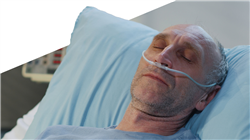University certificate
The world's largest faculty of nursing”
Introduction to the Program
With this 100% online Postgraduate diploma, you will delve into advanced pain management techniques, strategies for symptom control and the provision of comprehensive support to terminally ill patients and their families"

Nursing professionals play a key role in the provision of palliative care by providing a holistic approach that encompasses pain control, symptom management, emotional and spiritual support, as well as interdisciplinary care coordination. Additionally, the importance of involving families and caregivers in the care process is recognized.
Therefore, this Postgraduate diploma was developed, which will address the origin and historical development of palliative care, providing a comprehensive understanding of its evolution and its impact on today's society. In addition, the importance of research and publication in the field of palliative care will be emphasized, fostering the development of critical and scientific skills necessary to contribute to the medical literature.
Additionally, nurses will be immersed in techniques of outreach and communication with families, crucial to manage the delicate process of grief and to avoid the conspiracy of silence, a common practice that can isolate the patient and family members. Ethical issues and key differences between palliative sedation and euthanasia will also be covered, providing a solid framework for ethical decision-making in complex situations.
Finally, specific conditions such as cachexia and sarcopenia will be examined and how these can be managed through appropriate nutrition, tailored to the patient's pathology. Methods for the administration of nutrition by gavage will be explored and the interactions between medications and nutrition will be discussed, ensuring that nurses can provide comprehensive care.
Accordingly, TECH has implemented a comprehensive, online program, designed to flexibly adapt to the specific demands of the student body. Only an electronic device with an Internet connection will be needed to access the study materials. In addition, the program incorporates the innovative Relearning methodology, which prioritizes the repetition of key concepts to ensure a deep and accurate understanding of the content.
You will be specialized to improve the quality of life of your patients, while strengthening their communication and empathy skills, crucial for the effective management of emotionally complex situations"
This Postgraduate diploma in Palliative and Family Care for Nursing contains the most complete and up-to-date scientific program on the market. The most important features include:
- Practical cases presented by experts in Palliative and Family Care for Nursing
- The graphic, schematic and practical contents with which it is conceived gather scientific and practical information on those disciplines that are essential for professional practice
- Practical exercises where self-assessment can be used to improve learning.
- Its special emphasis on innovative methodologies
- Theoretical lessons, questions to the expert, debate forums on controversial topics, and individual reflection assignments
- Content that is accessible from any fixed or portable device with an Internet connection
This comprehensive program will ensure you, not only expand your technical knowledge, but also update your empathy and communication skills, essential elements in palliative care.Enroll now!”
The program’s teaching staff includes professionals from the sector who contribute their work experience to this specializing program, as well as renowned specialists from leading societies and prestigious universities.
The multimedia content, developed with the latest educational technology, will provide the professional with situated and contextual learning, i.e., a simulated environment that will provide immersive education programmed to learn in real situations.
This program is designed around Problem-Based Learning, whereby the professional must try to solve the different professional practice situations that arise during the course. For this purpose, students will be assisted by an innovative interactive video system created by renowned and experienced experts.
You will analyze the organizational structure of palliative care services, gaining insight into the various forms of implementation and management of these services in different healthcare settings"

You will delve into techniques for approaching family members, as well as strategies for managing bereavement in a compassionate and respectful manner, all through an extensive library of multimedia resources"
Why study at TECH?
TECH is the world’s largest online university. With an impressive catalog of more than 14,000 university programs available in 11 languages, it is positioned as a leader in employability, with a 99% job placement rate. In addition, it relies on an enormous faculty of more than 6,000 professors of the highest international renown.

Study at the world's largest online university and guarantee your professional success. The future starts at TECH”
The world’s best online university according to FORBES
The prestigious Forbes magazine, specialized in business and finance, has highlighted TECH as “the world's best online university” This is what they have recently stated in an article in their digital edition in which they echo the success story of this institution, “thanks to the academic offer it provides, the selection of its teaching staff, and an innovative learning method aimed at educating the professionals of the future”
A revolutionary study method, a cutting-edge faculty and a practical focus: the key to TECH's success.
The most complete study plans on the university scene
TECH offers the most complete study plans on the university scene, with syllabuses that cover fundamental concepts and, at the same time, the main scientific advances in their specific scientific areas. In addition, these programs are continuously being updated to guarantee students the academic vanguard and the most in-demand professional skills. In this way, the university's qualifications provide its graduates with a significant advantage to propel their careers to success.
TECH offers the most comprehensive and intensive study plans on the current university scene.
A world-class teaching staff
TECH's teaching staff is made up of more than 6,000 professors with the highest international recognition. Professors, researchers and top executives of multinational companies, including Isaiah Covington, performance coach of the Boston Celtics; Magda Romanska, principal investigator at Harvard MetaLAB; Ignacio Wistumba, chairman of the department of translational molecular pathology at MD Anderson Cancer Center; and D.W. Pine, creative director of TIME magazine, among others.
Internationally renowned experts, specialized in different branches of Health, Technology, Communication and Business, form part of the TECH faculty.
A unique learning method
TECH is the first university to use Relearning in all its programs. It is the best online learning methodology, accredited with international teaching quality certifications, provided by prestigious educational agencies. In addition, this disruptive educational model is complemented with the “Case Method”, thereby setting up a unique online teaching strategy. Innovative teaching resources are also implemented, including detailed videos, infographics and interactive summaries.
TECH combines Relearning and the Case Method in all its university programs to guarantee excellent theoretical and practical learning, studying whenever and wherever you want.
The world's largest online university
TECH is the world’s largest online university. We are the largest educational institution, with the best and widest online educational catalog, one hundred percent online and covering the vast majority of areas of knowledge. We offer a large selection of our own degrees and accredited online undergraduate and postgraduate degrees. In total, more than 14,000 university degrees, in eleven different languages, make us the largest educational largest in the world.
TECH has the world's most extensive catalog of academic and official programs, available in more than 11 languages.
Google Premier Partner
The American technology giant has awarded TECH the Google Google Premier Partner badge. This award, which is only available to 3% of the world's companies, highlights the efficient, flexible and tailored experience that this university provides to students. The recognition as a Google Premier Partner not only accredits the maximum rigor, performance and investment in TECH's digital infrastructures, but also places this university as one of the world's leading technology companies.
Google has positioned TECH in the top 3% of the world's most important technology companies by awarding it its Google Premier Partner badge.
The official online university of the NBA
TECH is the official online university of the NBA. Thanks to our agreement with the biggest league in basketball, we offer our students exclusive university programs, as well as a wide variety of educational resources focused on the business of the league and other areas of the sports industry. Each program is made up of a uniquely designed syllabus and features exceptional guest hosts: professionals with a distinguished sports background who will offer their expertise on the most relevant topics.
TECH has been selected by the NBA, the world's top basketball league, as its official online university.
The top-rated university by its students
Students have positioned TECH as the world's top-rated university on the main review websites, with a highest rating of 4.9 out of 5, obtained from more than 1,000 reviews. These results consolidate TECH as the benchmark university institution at an international level, reflecting the excellence and positive impact of its educational model.” reflecting the excellence and positive impact of its educational model.”
TECH is the world’s top-rated university by its students.
Leaders in employability
TECH has managed to become the leading university in employability. 99% of its students obtain jobs in the academic field they have studied, within one year of completing any of the university's programs. A similar number achieve immediate career enhancement. All this thanks to a study methodology that bases its effectiveness on the acquisition of practical skills, which are absolutely necessary for professional development.
99% of TECH graduates find a job within a year of completing their studies.
Postgraduate Diploma in Palliative and Family Care for Nursing
The Postgraduate Diploma in Palliative and Family Care for Nursing created by TECH Global University is an educational program designed for professionals who wish to acquire specialized knowledge in the comprehensive care of patients in end-of-life situations, as well as in the support of their families during this difficult process. This 100% online course provides comprehensive education in pain management, symptom control, effective communication and emotional support for both patients and their loved ones. During this program, you will explore in depth the fundamental principles of palliative care and family care. You will learn advanced strategies for assessing and addressing the physical, emotional and spiritual needs of patients in advanced illness, as well as providing support and guidance to their families and caregivers. A hallmark of our program is the integration of multidisciplinary approaches to develop personalized, patient- and family-centered care plans.
Qualify as a nurse expert in palliative and family care
The online modality of our program gives you the flexibility to study from anywhere and at any time, adapting your learning schedule to your work and personal responsibilities. You will have access to virtual classes taught by experts in palliative care and family care, as well as interactive teaching resources and innovative learning tools. In addition, you will be supported by a team of specialized tutors and mentors who will guide you, providing personalized feedback and academic guidance to maximize your learning and professional development in palliative and family care. Upon completion, you will earn a recognized qualification that supports your education and experience in this crucial field of healthcare. This certification will open up new career opportunities and enable you to make a significant contribution to the well-being and quality of life of patients in end-of-life situations, as well as to the emotional and practical support of their families.







